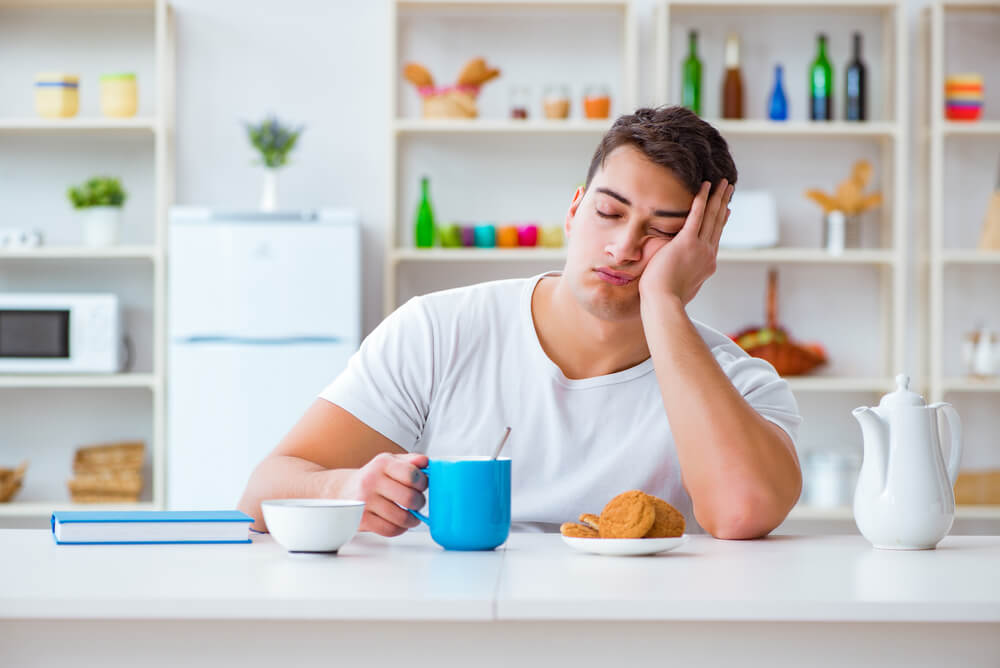Feeling Tired All The Time? How Diet Can Affect Sleep

If it seems impossible to wake up feeling refreshed or energized throughout your day, your diet could be the culprit!
Feeling tired excessively could be because you are—or aren’t—doing some very common things when it comes to the way you eat and how active you are throughout the day. Your diet affects more than the numbers on the scale; in fact, what and when you eat can greatly affect your sleep.
In this blog, NJdiet provides tips on how to incorporate lifestyle changes
for a better night’s sleep. Additionally, we share the foods that will keep you well rested –and the things you should definitely avoid when it comes to getting a good night’s sleep!
Better Sleep Habits
Eating just before going to bed could leave you tossing and turning all night as your digestive system processes your food. It’s best to avoid eating heavy meals at night, and if you’re going to have a big meal, have it in the middle of the day. This way you’re less likely to store the extra calories as fat because your body will have time to burn them off.
Heartburn is a frequent complaint when it comes time to hit the sack, and the reason being is that heartburn gets worse as you lie flat because there is no gravity to keep your stomach acid down. In some cases, stomach acid can splash up to the larynx and cause a spasm in your airway, so diet, lifestyle modification can help combat your symptoms and give you a better, more restful sleep.
Similarly, it’s a idea to stop eating a few hours before bedtime. For example, if you’re going to eat dinner at 6 p.m., let that be it for the night. Additionally, eat enough so you’re satiated, but not too full – which could negatively impact sleep. Going to bed hungry can also disrupt your sleep, however, so ideally, you should eat enough at dinner to keep you satiated until bedtime. If you need to sip on something before bed, try something calorie — and caffeine-free — like herbal tea, or warm skim milk.
How A Healthy Diet Can Improve Sleep
A healthy meal plan and good sleep go hand-in-hand. One of the best things you can do to get better sleep is to maintain a healthy weight and eat a nutritious diet, and studies have shown that being significantly overweight impacts your overall sleep, leading to snoring and sleep apnea.
Eating an overall healthy and nutrient-rich diet affects our brain health and activity — and in turn, our sleep. Eating healthy and allowing the body to absorb proper nutrients provides the brain with the chemical environment that it needs, and the nutrients we get from food serve as the building blocks for other minerals and proteins that are needed to create the amino acids that are involved in sleep.
For your best night’s sleep, strive to eat a balanced diet that emphasizes fresh fruits, vegetables, whole grains, and low-fat proteins that are rich in B vitamins, like fish, poultry, meat, eggs, and dairy. B vitamins may help to regulate melatonin, a hormone that regulates your sleep cycles.
The Best Foods For Sleep
There are four main vitamins and minerals that can be found in food that aid in promoting sleep: tryptophan, magnesium, calcium, and B6. Some of these substances help the body produce melatonin, the hormone that is responsible for regulating your circadian rhythm (sleep/wake patterns). When you’re close to bedtime, melatonin production naturally increases to help you sleep.
Some foods are naturally packed with these essential vitamins and minerals, and can aid in providing you with good, quality sleep. Most of these are available as over-the-counter supplements, but it’s always recommended to get these vitamins and minerals from the foods you eat.
Tryptophan
Here are some some of the best foods loaded with tryptophan:
- Dairy products (milk, low-fat yogurt, cheese)
- Poultry (turkey, chicken)
- Seafood (shrimp, salmon, halibut, tuna, sardines, cod)
- Nuts and seeds (flax, sesame, pumpkin, sunflower, cashews, peanuts, almonds, walnuts)
- Legumes (kidney beans, lima beans, black beans split peas, chickpeas)
- Fruits (apples, bananas, peaches, avocado)
- Vegetables (spinach, broccoli, turnip greens, asparagus, onions, seaweed)
- Grains (wheat, rice, barley, corn, oats)
Magnesium
Excellent sources of magnesium are:
- Dark leafy greens (baby spinach, kale, collard greens)
- Nuts and seeds (almonds, sunflower seeds, brazil nuts, cashews, pine nuts, flaxseed, pecans)
- Wheat germ
- Fish (salmon, halibut, tuna, mackerel)
- Soybeans
- Banana
- Avocados
- Low-fat yogurt
Calcium
Dairy products that contain both tryptophan and calcium are among the best sleep inducers. Sources of calcium include:
- Dark leafy greens
- Low-fat milk
- Cheeses
- Yogurt
- Sardines
- Fortified cereals
- Soybeans
- Fortified orange juice
- Enriched breads and grains
- Green snap peas
- Okra
- Broccoli
Vitamin B6
A deficiency in B6 is also linked to symptoms of depression and mood disorders which can lead to insomnia. Highest sources of B6 are:
- Sunflower seeds
- Pistachio nuts
- Flaxseed
- Fish (tuna, salmon, halibut)
- Meat (chicken, tuna, lean pork, lean beef,)
- Dried Prunes
- Bananas
- Avocado
- Spinach
Melatonin
Some excellent sources of naturally occurring melatonin in foods:
- Fruits and vegetables (tart cherries, corn, asparagus, tomatoes, pomegranate, olives, grapes, broccoli, cucumber)
- Grains (rice, barley, rolled oats)
- Nuts and Seeds (walnuts, peanuts, sunflower seeds, mustard seeds, flaxseed)
- Drinks that are great for sleep
Drinks
Many drinks contain essential vitamins and minerals that help aid with sleep. A few of the best ones to try are:
- Warm milk
- Almond milk
- Valerian tea
- Chamomile tea
- Tart cherry juice
- Passion fruit tea
- Peppermint tea
Foods And Drinks That Can Disrupt Sleep
Just as there are foods and drinks that help promote sleep, there are also foods to avoid that can rob you of sleep. Many of the foods to avoid on this list are healthy for you to eat, but just not recommended to eat before bed because they can interfere with sleep. Some of them are:
- Alcohol: Contrary to popular belief alcohol does not help promote sleep. While it can make you drowsy and more likely to fall asleep faster, it often disrupts sleep and can deter you from entering the deeper, much needed phases of the sleep cycles.
- Caffeine: It’s not recommended to drink caffeinated beverages such as coffee or soda after lunch (and especially near bedtime), as it can interfere with sleep by keeping your mind overactive. Foods with dark chocolate are also high in caffeine and should be avoided late in the day.
- High-Fat Foods: Fat triggers the digestive processes and causes a build up of stomach acids, which while lying down can creep into the esophagus causing discomfort. A high fat diet also messes with the production of orexin, one of the neurotransmitters that helps regulate your sleep/wake cycle along with melatonin.
- Spicy Meals And Condiments. While spicy foods are often delicious and even have many noted health benefits, eating spicy foods too close to bedtime can be a very bad idea. Spicy foods are notorious for causing heartburn, indigestion, and acid reflux. Heartburn can be made worse while lying down as it allows the acids to creep up into the esophagus and burn the sensitive lining.
- Protein Rich Foods: These foods can also disrupt sleep when eaten too close to bedtime, as protein is difficult for the digestive system to break down. Eating protein rich meals near bedtime causes the body to spend more time working on digestion rather than focusing on sleeping.
- Foods Containing Water: Fruits such as watermelon and celery are natural diuretics which help push water through your system. Eating these types of foods and drinking anything too close to bedtime can cause you to lose sleep from middle of the night bathroom trips.
If you’re following these eating tips and other sleep hygiene practices, but still find yourself having trouble sleeping at night, there’s a chance that you could be suffering from a sleep disorder. If you’re regularly having sleep troubles you might want to consult with your primary care physician or contact a sleep center to get to the root of the problem.
If you are ready to lose weight and get healthier, NJ
Diet is here to help! Every factor regulating metabolism, appetite, fat storage & fat burning is carefully energetically tested for success. Using DNA Testing over 40 different factors are assessed genetically. We help you not only keep the fat off, but to stay healthy.
Our program is not only aimed at promoting healthy weight loss, but aims to improve your total wellness — where the side effect is weight loss, but the end result is better overall health and well being!
When you come in for your initial evaluation and consultation at NJ
Diet, we will explain how many metabolic factors are assessed to genetically make sure you not only lose the weight, but ensures you keep it off and stay healthy for a lifetime.
Attending the Initial Evaluation and Consultation is normally $99, but by registering on our website it will only cost $27!
We welcome the opportunity for you to have a consultation with us, so register online now!




